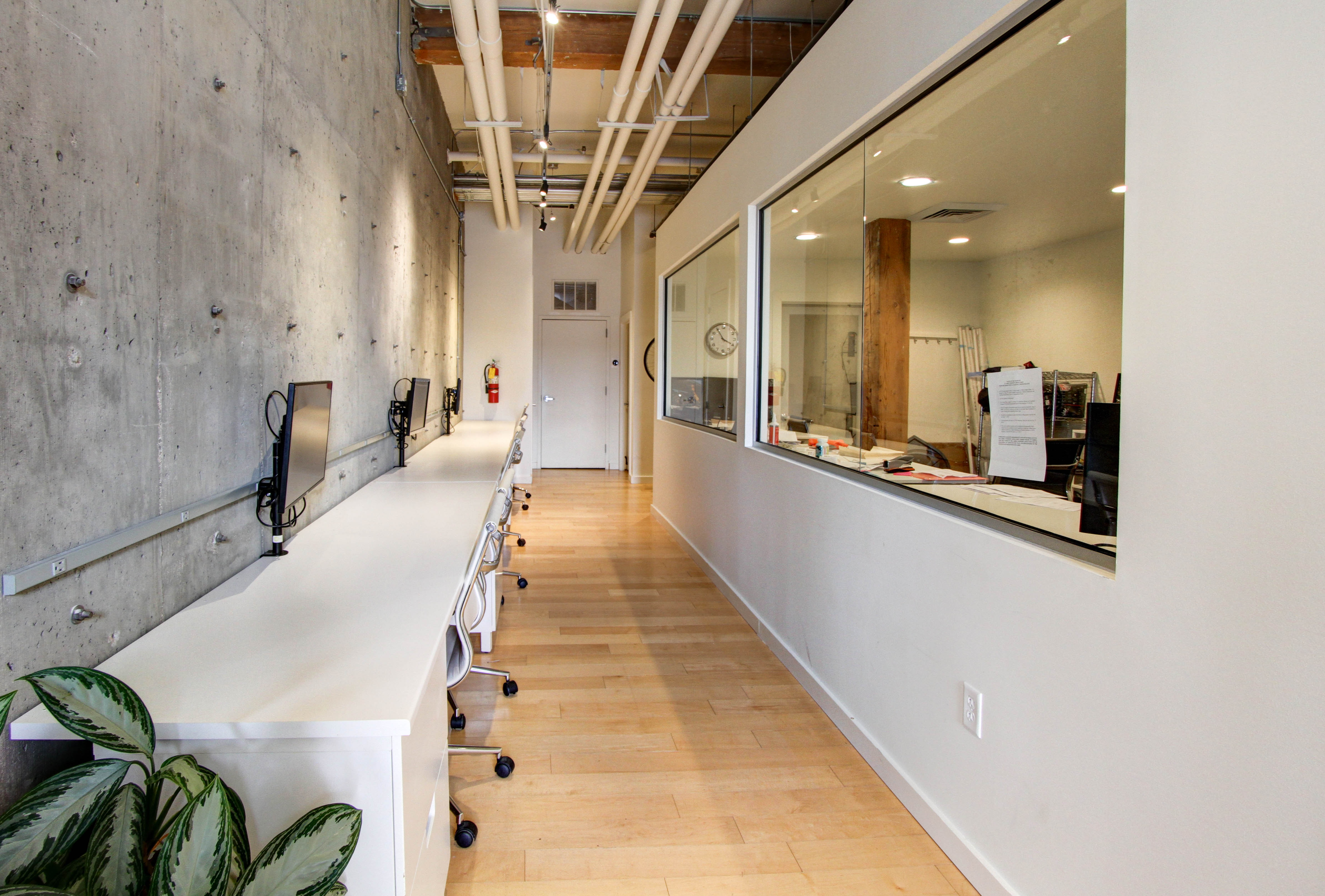4 Tips for Anyone New to Coworking
If you have never used a coworking space before, you may not know what to expect when you do give it a try. In this post, we hope to help you get up to speed on general coworking etiquette, so you feel that much more comfortable coming to work here.
1. Don’t forget your headphones
Whether you like to listen to music, podcasts, or white noise while you work, make sure you do so privately. A good pair of headphones are an absolute must-have in a coworking space. Not only do they ensure you aren’t bothering others, but noise-canceling headphones can help block out conversations and activities that may be going on around you. Keep in mind that this goes for calls and meetings as well as music. Odds are, nobody else wants to hear both sides of your conversation! Of course, one of the many benefits of a coworking space is the chance to meet and share ideas with other professionals, but sometimes you don’t want to be disturbed, and headphones are a great way to signal that.
2. Make use of call booths
Most communal offices have “phone booths” for making calls or taking short meetings. These booths tend to be soundproof and allow you to talk freely without disturbing those working around you. Make use of these booths as much as possible when you’re on calls or meetings. Some coworking spaces will have a process of reserving booths, while others will be available on a first-come-first-served basis.
3. Keep an eye on the clock
In coworking space etiquette, time is everything. If you’ve reserved a meeting room, be mindful of the person who has booked it after you. If you’re using a phone booth, be aware that others may be waiting to use it as well. The same goes for booking tables or workspaces. Most things in coworking spaces are shared, so keeping to a schedule makes you a good communal user and allows others to do their work as well.
4. Clean up after yourself
General etiquette in most public spaces dictates you clean up after yourself, and coworking spaces are no different. While every shared office will have janitorial services, it’s important to leave your workspace just as clean as you found it, so that the next person can easily sit down and get to work. This also goes for the communal kitchens many coworking spaces will have, as well as printer rooms, meeting spaces, and phone booths.
Whether you decide to work at Work Hive or use another coworking space, these general rules should apply. Being mindful of how we share the space helps us all be comfortable and productive.
Work Hive has the amenities you need to make your day productive -- natural lighting, adjustable height desks in a quiet coworking studio, printing and scanning, coffee, conference rooms, phone rooms, and more. Come try coworking in Downtown Salt Lake City, or try our Sugar House location.
Why 300,000 Small Business Call Utah Home
Utah has a high number of small businesses, with approximately 283,000 small businesses in the state as of 2020, representing 99.9% of all businesses in the state. There are a number of factors that may contribute to this high number of small businesses in Utah, including:
- Strong economy: Utah has a strong and growing economy, with low unemployment rates and a diverse range of industries. This can create a favorable environment for small businesses, with plenty of opportunities for growth and success.
- Favorable business climate: Utah has a business-friendly environment, with relatively low taxes and a streamlined regulatory process. This can make it easier to start and operate a small business in the state.
- Skilled workforce: Utah has a highly educated workforce, with a number of top-ranked universities and technical schools in the state. This can be beneficial for small businesses that need access to skilled employees.
- Supportive community: Utah has a strong sense of community, with many organizations and resources available to support small businesses. For example, the state has a number of business incubators and accelerators, as well as organizations like the Utah Small Business Development Center and SCORE, which offer business development resources and support.
- Quality of life: In addition to its strong business environment, Utah also offers a high quality of life, with a variety of outdoor recreational opportunities, a thriving arts and culture scene, and a diverse population. This can make it an attractive place for entrepreneurs to live and work.

If you are considering starting a small business in Utah, it may be helpful to research the local market, reach out to local business resources, and speak with other small business owners in the area to get a better understanding of the opportunities and challenges that exist in the state. Work Hive is a great place to network! Work Hive is a flexible coworking space featuring a range of solutions to suit your need: we have private offices, solo work stations, conference rooms for group work, a kitchen area, and all the space, technology and amenities you need to get your team off the ground. We have locations in Downtown Salt Lake City, and Sugar House.
Utah is Home to Almost 300,000 Small Businesses.. Here's Why
Utah has a high number of small businesses, with approximately 283,000 small businesses in the state as of 2020, representing 99.9% of all businesses in the state. There are a number of factors that may contribute to this high number of small businesses in Utah, including:
- Strong economy: Utah has a strong and growing economy, with low unemployment rates and a diverse range of industries. This can create a favorable environment for small businesses, with plenty of opportunities for growth and success.
- Favorable business climate: Utah has a business-friendly environment, with relatively low taxes and a streamlined regulatory process. This can make it easier to start and operate a small business in the state.
- Skilled workforce: Utah has a highly educated workforce, with a number of top-ranked universities and technical schools in the state. This can be beneficial for small businesses that need access to skilled employees.
- Supportive community: Utah has a strong sense of community, with many organizations and resources available to support small businesses. For example, the state has a number of business incubators and accelerators, as well as organizations like the Utah Small Business Development Center and SCORE, which offer business development resources and support.
- Quality of life: In addition to its strong business environment, Utah also offers a high quality of life, with a variety of outdoor recreational opportunities, a thriving arts and culture scene, and a diverse population. This can make it an attractive place for entrepreneurs to live and work.

If you are considering starting a small business in Utah, it may be helpful to research the local market, reach out to local business resources, and speak with other small business owners in the area to get a better understanding of the opportunities and challenges that exist in the state. Work Hive is a great place to network! Work Hive is a flexible coworking space featuring a range of solutions to suit your need: we have private offices, solo work stations, conference rooms for group work, a kitchen area, and all the space, technology and amenities you need to get your team off the ground. We have locations in Downtown Salt Lake City, and Sugar House.
4 Keys to a Successful Product Launch
As a small business owner, one of the most exciting things you can do is launch a new product or service. This can be a great way to grow your business and reach new customers, but it can also be a daunting task. Here are some tips to help you successfully launch a new product or service.

1. First, it's important to carefully plan and research your new offering. This means understanding your target market and what they need or want. Conducting market research can help you identify potential customers and gather insights into their preferences and behavior. This can also help you understand the competition and position your product or service in a way that sets it apart.
2. Once you have a clear understanding of your market and product, it's time to develop a launch plan. This should include setting clear goals and objectives for the launch, as well as a timeline for key activities such as product development, marketing, and sales. It's also important to determine how you will measure the success of the launch, so you can make adjustments and improvements as needed.
3. Next, you'll need to create a marketing and sales strategy to reach potential customers and drive demand for your new product or service. This could include a range of activities, such as advertising, public relations, social media marketing, and email marketing. It's also important to build buzz and anticipation for the launch, through things like pre-launch promotions and special offers.
4. Finally, it's essential to manage the launch process carefully, to ensure that everything goes smoothly. This means working closely with your team, suppliers, and other stakeholders to ensure that everything is on track. It's also important to be prepared for potential challenges or issues that may arise, and to be ready to pivot or make changes as needed.
Launching a new product or service can be an exciting and rewarding experience for small business owners. By carefully planning and executing your launch, you can increase your chances of success and grow your business in the process.
If you have other strategies for managing product launch within a small business, share those ideas with your network at Work Hive! As this is an ever-evolving topic, it is never a bad idea to share your latest strategies with your fellow Work Hive community members in Salt Lake City. Work Hive is a great place to grow your network!
Cybersecurity Basics for Small Business Owners
 As an entrepreneur, it's important to prioritize cybersecurity for your small business. With the increasing prevalence of cyber threats, protecting your business's sensitive information is crucial.
As an entrepreneur, it's important to prioritize cybersecurity for your small business. With the increasing prevalence of cyber threats, protecting your business's sensitive information is crucial.
One of the biggest advantages of being a small business owner is the ability to be flexible and adapt to change. This same flexibility can be applied to your cybersecurity strategy. By regularly reassessing and updating your security measures, you can stay one step ahead of potential threats.
First and foremost, make sure to use strong, unique passwords for all of your business's online accounts. Avoid using the same password for multiple accounts, and consider using a password manager to generate and store complex passwords.
Next, invest in reliable security software. This can include antivirus and anti-malware programs, as well as a firewall to protect your business's network. Regularly update this software to ensure that it can defend against the latest threats.
Additionally, educate your employees on cybersecurity best practices. This can include training on how to create strong passwords, recognize phishing attempts, and safely handle sensitive information. By creating a culture of security within your organization, you can reduce the risk of a breach.
It's also important to regularly back up your business's important data. In the event of a cybersecurity attack or data loss, having backups can help you recover quickly and minimize the impact on your business.
By being proactive and flexible in your approach, you can protect your business and its sensitive information from potential threats.
If you have other strategies for managing cybersecurity within a small business, share those ideas with your network at Work Hive! As this is a constantly evolving issue with constantly evolving strategies for mitigation, it is never a bad idea to share your latest strategies with your fellow Work Hive community members in Salt Lake City.





